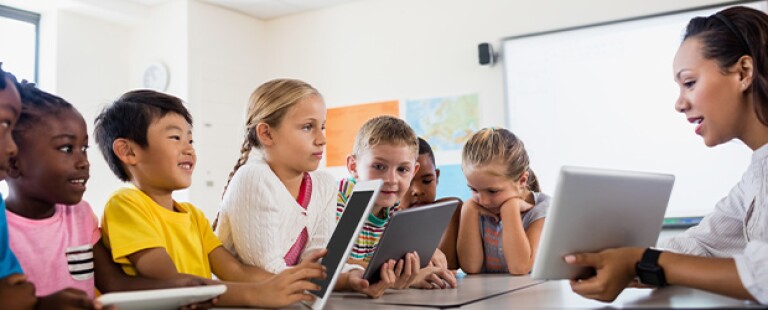Enroll in Primary Science Tuition Singapore for a Strong Science Foundation
Wiki Article
Discover the Essential Benefits of Recognizing Key Science for Young Learners
The relevance of key science education for young learners prolongs much past plain understanding procurement; it offers as an essential column in establishing vital skills such as crucial thinking, problem-solving, and creativity. Engaging with clinical ideas via interactive and inquiry-based activities not only cultivates inquisitiveness however likewise lays the groundwork for resistant, confident learners.Enhancing Crucial Thinking Abilities
Promoting critical believing skills in young learners is necessary for their cognitive growth and future scholastic success. Important reasoning enables children to evaluate details, assess proof, and make informed decisions, which are vital skills in today's information-rich society. By taking part in scientific questions, young students can enhance these abilities as they explore principles via thinking, monitoring, and experimentation.In primary scientific research education and learning, educators can facilitate crucial reasoning by motivating pupils to ask questions, develop hypotheses, and conduct experiments. This hands-on strategy allows kids to practice analytical and develop logical thinking abilities. As an example, when trainees explore the residential or commercial properties of products or the concepts of activity, they find out to evaluate their findings critically and draw conclusions based upon evidence.
Furthermore, conversations and joint jobs can promote vital reasoning by providing opportunities for students to express their thoughts, challenge presumptions, and take into consideration diverse viewpoints. By creating an encouraging setting that values query and representation, instructors can support vital assuming skills that empower young students to come to be independent thinkers and lifelong students. Inevitably, enhancing these abilities lays a durable structure for their future scholastic ventures and personal development.
Fostering Interest and Expedition

Key scientific research education provides a structured setting where young students can explore various sensations via hands-on experiments and observations. By allowing them to connect with materials and take part in inquiry-based discovering, instructors create chances for youngsters to formulate hypotheses, test their ideas, and draw final thoughts. Such experiences support a sense of marvel and excitement about scientific research.

Structure Confidence in Issue Solving
Building confidence in problem-solving is a vital part of key science education and learning that encourages young students to approach challenges with strength and imagination - primary science tuition Singapore. When children are encouraged to engage with scientific ideas through hands-on tasks and inquiry-based learning, they create necessary abilities in crucial thinking and evaluation. This process not just boosts their understanding of scientific principles but additionally fosters a feeling of possession over their knowingTo develop confidence, educators should develop an encouraging setting where mistakes are viewed as possibilities for development instead than failings. This urges pupils to take risks and check out numerous remedies to troubles. By offering scaffolding and guidance, educators can help pupils navigate intricate jobs, progressively boosting their self-reliance in analytic situations.
Furthermore, joint knowing experiences, such as team jobs or experiments, can further boost trainees' self-confidence as they find out to express their thoughts and listen to others' point of views. These interactions support social skills and reinforce the concept that analytical is typically a cumulative venture. Eventually, growing confidence in analytical prepares young learners for future scholastic challenges and outfits them with the devices needed for long-lasting discovering.
Motivating Imagination and Development
In the realm of primary scientific research education, motivating creative thinking and technology is necessary for growing a vibrant knowing atmosphere. By cultivating a culture where young students can check out concepts and experiment easily, instructors assist students create crucial thinking skills and a passion for exploration. Creativity in scientific research motivates youngsters to ask concerns, develop hypotheses, and participate in hands-on tasks that promote their imagination.Integrating open-ended tasks and inquiry-based learning right into the educational program permits pupils to reveal their special perspectives and remedies. For example, when tasked with solving a problem related to their environment, pupils can brainstorm numerous approaches, leading to innovative end results that showcase their originality. This not just strengthens their understanding of clinical ideas however additionally infuses a sense of ownership over their discovering process.
Additionally, imaginative science education and learning nurtures partnership among peers, as students often share ideas and develop on one an additional's insights - primary science tuition Singapore. This joint spirit advertises not only advancement yet also crucial social skills. Hence, by focusing on imagination and advancement in main science education, we empower young students to assume seriously, embrace challenges, and visualize opportunities, laying a strong foundation for long-lasting knowing and exploration
Getting Ready For Future Discovering Obstacles
Young learners' capability to browse future discovering challenges depends upon a strong foundation in main science education and learning. This foundational understanding equips students with crucial thinking abilities and a systematic method to analytic, important for taking on intricate issues in an ever-evolving globe. Primary science cultivates inquiry-based knowing, urging trainees to ask click to read concerns, explore theories, and involve in hands-on experiments.As they establish these abilities, students become skilled at assessing information, acknowledging weblink patterns, and attracting educated final thoughts. Such competencies are vital not only in scientific fields but also in mathematics, engineering, and technology (STEM), where interdisciplinary expertise is increasingly essential.
In addition, key scientific research education grows a sense of curiosity and durability in young students, enabling them to view obstacles as opportunities for development. As they come across and overcome barriers in their clinical expeditions, they construct confidence in their ability to introduce and adapt.
Eventually, a solid foundation in key science not just prepares young learners for academic pursuits yet also furnishes them with the tools essential for long-lasting knowing and versatility in a rapidly changing global landscape. By purchasing primary science education and learning, we are spending in the future possibility of our students.
Verdict
Recognizing primary science is vital for young students, as it fosters crucial thinking, curiosity, and creative thinking. Ultimately, the benefits of main science education prepare children for future academic searches and instill lifelong knowing behaviors important for prospering in an ever-evolving world.The value of key scientific research education and learning for young students expands far beyond plain understanding procurement; it offers as a basic column in developing crucial abilities such as crucial thinking, analytic, and creative thinking. By creating a supportive atmosphere that values questions and reflection, teachers can nurture vital assuming skills that empower young students to end up being independent thinkers and long-lasting learners. Hence, by focusing on imagination and development in primary scientific research education, we encourage young Recommended Reading learners to assume critically, embrace obstacles, and picture possibilities, laying a strong structure for lifelong understanding and expedition.
Young learners' capacity to browse future understanding obstacles hinges on a solid foundation in primary scientific research education.Comprehending primary science is critical for young learners, as it fosters essential reasoning, interest, and creative thinking.
Report this wiki page